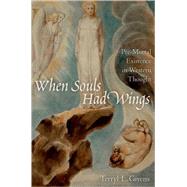When Souls Had Wings Pre-Mortal Existence in Western Thought
, by Givens, Terryl L.- ISBN: 9780195313901 | 0195313909
- Cover: Hardcover
- Copyright: 10/8/2009
The notion that we spring into existence ex nihilo at birth strikes many people as counter-intuitive. By contrast, the idea that we have an eternal identity appeals to some deep intuition about the self. And indeed, belief in the soul's pre-mortal existence has a long history in Western thought. It has been articulated in virtually every age, from ancient times to the present. Some have deployed it in support of arguments for the immortality of the soul. Others have used it to account for individual differences evident at birth. Still others see it as the explanation for innate ideas. Belief in pre-mortal existence also appeals to humanity's sense of alienation. Humans seem to be born homesick for heaven. In the popular imagination, death is the soul's return to the God who gave it life. It is the soul's "going home," the return of the Prodigal to the embrace of a Heavenly Father. Implicit in this familiar image of the afterlife is the notion of a pre-mortal life. In this book Terryl Givens and John Tanner offer the first systematic exploration of this fascinating if generally unfamiliar feature of Western cultural history. They not only trace the history of the idea of pre-existence, but attempt to understand its meaning for those who embrace it, the reasons for its prevalence, the cultural, ideological, and theological functions it has served, and the reasons for its disappearance at various times in Western history. In the process they draw on ancient pre-Christian thought, classical Christian and non-Christian theological sources, literary works and popular culture. They conclude by noting the existence of a wide range of other theories that do comparable intellectual work, ranging from the Jungian collective unconscious to the pre-wired mind of modern linguistics. All of these, say Givens and Tanner, attest to universal sense of a human inheritance that seems to transcend the immediate and purely biological.






